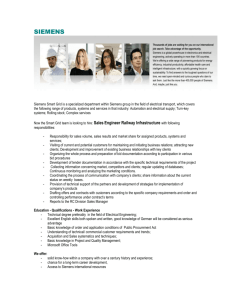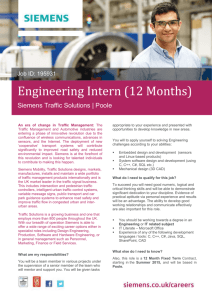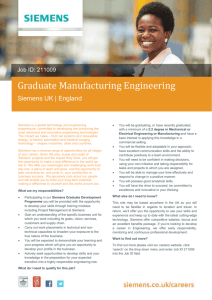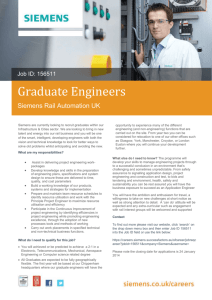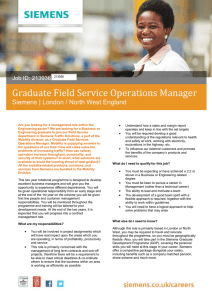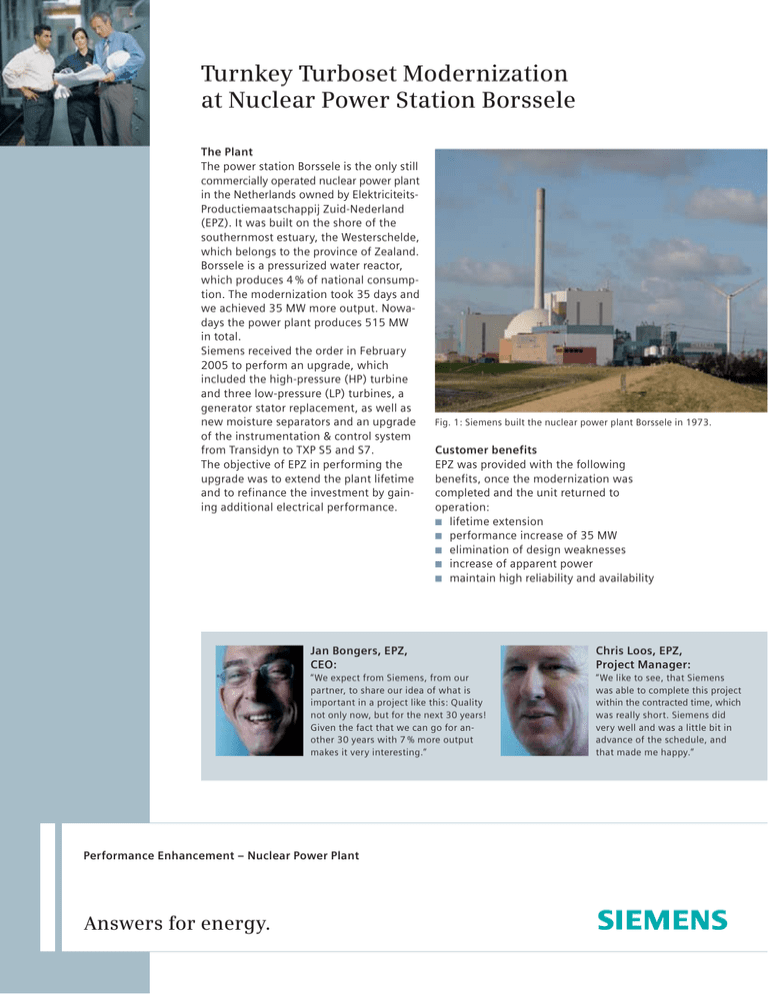
Turnkey Turboset Modernization
at Nuclear Power Station Borssele
The Plant
The power station Borssele is the only still
commercially operated nuclear power plant
in the Netherlands owned by ElektriciteitsProductiemaatschappij Zuid-Nederland
(EPZ). It was built on the shore of the
southernmost estuary, the Westerschelde,
which belongs to the province of Zealand.
Borssele is a pressurized water reactor,
which produces 4 % of national consumption. The modernization took 35 days and
we achieved 35 MW more output. Nowadays the power plant produces 515 MW
in total.
Siemens received the order in February
2005 to perform an upgrade, which
included the high-pressure (HP) turbine
and three low-pressure (LP) turbines, a
generator stator replacement, as well as
new moisture separators and an upgrade
of the instrumentation & control system
from Transidyn to TXP S5 and S7.
The objective of EPZ in performing the
upgrade was to extend the plant lifetime
and to refinance the investment by gaining additional electrical performance.
Customer benefits
EPZ was provided with the following
benefits, once the modernization was
completed and the unit returned to
operation:
■ lifetime extension
■ performance increase of 35 MW
■ elimination of design weaknesses
■ increase of apparent power
■ maintain high reliability and availability
Jan Bongers, EPZ,
CEO:
Chris Loos, EPZ,
Project Manager:
“We expect from Siemens, from our
partner, to share our idea of what is
important in a project like this: Quality
not only now, but for the next 30 years!
Given the fact that we can go for another 30 years with 7 % more output
makes it very interesting.”
“We like to see, that Siemens
was able to complete this project
within the contracted time, which
was really short. Siemens did
very well and was a little bit in
advance of the schedule, and
that made me happy.”
Performance Enhancement – Nuclear Power Plant
Answers for energy.
Fig. 1: Siemens built the nuclear power plant Borssele in 1973.
Features
Turbine Design Features
■ HP design features – 3DS™/3DV™ blades
Since the mid-90s, Siemens has been
supplying fully three dimensionally
designed drum stages in HP & IP turbines. These drum stages are equipped
with twisted and bowed blades called
3DS blades (Siemens trademark and
patent). A few years later Siemens introduced a highly sophisticated blading technology called 3DV. This technology optimizes the blade path by a
numerical method, which varies the
stage reaction and stage loading. This
automatically results in optimized
blade path efficiency. All these new
technologies were used for the HP
modernization.
■
LP design features
The LP turbines were modernized with
a new blade path with larger last stage
blades. This led to an increase of the
exhaust annulus area from 8 m2 (old
design) to 10 m2 per flow, which reduces the exhaust losses. 3DS blades
were used for the drum stages at the
front, and all rotating blades were designed with an integral shroud, even
the large last stage blades. The new
10 m² blade path was carefully designed with state-of-the-art and fully
three dimensional design tools like advanced computational fluid dynamic
and finite element methods for the
aerodynamic and mechanical design.
The final acceptance test and reliability
run proved the new technology.
Fig. 2: Cross-section of the turbine rope.
Generator Stator Exchange Features
To extend the lifetime of the generator
and thus maintain the high reliability and
availability of the machine, as well as to
support the uprate of the turbine, it was
necessary to replace the generator stator.
■
■
Advanced stator end-winding design
The Siemens advanced stator endwinding design reduces maintenance
efforts due to enhanced end-winding
robustness and improves end-winding
vibration behavior. Through the axially
free and tangentially as well as radially
flexible end-windings the natural
frequency of the whole end-winding
basket was lowered, which prevents
operation of the generator end-winding close to resonance.
Improved stator core end-steps
The stepped, laminated end packs and
end shields minimize axial flux penetration into the core and reduce losses.
With a new monoblock rotor, inner
casing, and stationary blade rings
manufactured with high alloy materials, the lifetime is extended. The highly effective protection measures
against droplet erosion and corrosion
are based on Siemens’ extensive experience.
Additional orders
In addition to the standard inspection, we
also received an order for special maintenance tasks on the auxiliaries and the
turbine.
The tasks on the turbine included for example the modification of the non-return
valves from hydraulic to pneumatic operation and the replacement of the fire
control dampers. The maintenance of the
auxiliaries included amongst others the
overhaul of the generator auxiliaries. The
gas dryer and the H2 equipment including
gas purity meter were replaced and the
purging gas was adapted from CO2 to
Argon, which was important to meet the
ATEX requirements.
References
This modernization of a complete turboset represented a considerable effort for
our customer and therefore also for us.
The cooperation and communication
between EPZ and Siemens as well as the
common responsibility and technical
know-how helped us to complete the
project successfully.
For more information please contact
your local Siemens sales representative.
The usage of a double shell inner casing is a further design feature.
Published by and copyright © 2009:
Siemens AG
Energy Sector
Freyeslebenstrasse 1
91058 Erlangen, Germany
Siemens Energy, Inc.
4400 Alafaya Trail
Orlando, FL 32826-2399, USA
www.siemens.com/energy
For more information, please contact
our Customer Support Center.
Phone: +49 180 524 70 00
Fax:
+49 180 524 24 71
(Charges depending on provider)
E-mail: support.energy@siemens.com
Energy Service Division
Order No. E50001-G520-A129-X-4A00
Printed in Germany
Dispo 34805, c4bs No. 7816
TH 258-090355 460326 DB 09092.0
Printed on elementary chlorine-free
bleached paper.
All rights reserved.
Trademarks mentioned in this document
are the property of Siemens AG, its affiliates,
or their respective owners.
Subject to change without prior notice.
The information in this document contains
general descriptions of the technical options
available, which may not apply in all cases.
The required technical options should therefore
be specified in the contract.

